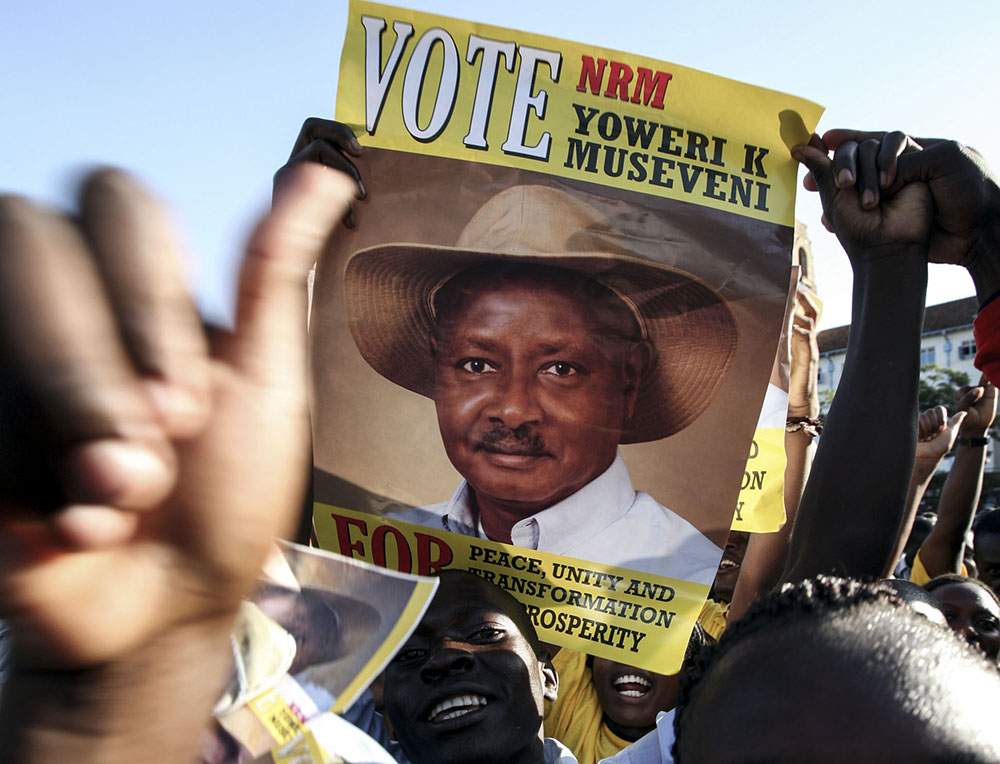Police fire teargas at supporters of Amama Mbabazi
Opposition parties in Uganda say a vicious campaign of murder, kidnapping and intimidation by President Yoweri Museveni’s ruling National Resistance Movement (NRM) in the run-up to presidential and parliamentary elections on February 18 makes a mockery of the polls.
Museveni, who will celebrate his 30th year in power at the end of this month, has done little to reassure the opposition that the elections will be free and fair.
“Thugs attacked [NRM party] supporters,” Museveni angrily told a press conference towards the end of December, after being pushed to comment on bloody clashes between his supporters and those of Amama Mbabazi, once the NRM’s secretary general and a former prime minister, who is now challenging him as an independent candidate.
“They are being rounded up because they attacked Ugandans and they will pay very dearly … He will regret. We shall smash all that little nonsense, which some people who don’t see far thought would help them,” Museveni said.
The “idiots and thugs” supporting his rival had touched the genitals of a leopard – an action that comes with obvious consequences. Among the individuals who would learn this lesson, he said, would be Christopher Aine, Mbabazi’s head of security.
Aine subsequently went missing. Opposition sources say he may already have died at the hands of security agents, but the presidency insist he is in hiding.
When a local tabloid published photographs of a body that Aine’s family said bore his features, the police arrested the publication’s editors and warned the family to desist from such statements.
Mbabazi claims more of his supporters have gone missing. In one incident, he says, a five-year-old burnt to death in an arson attack. He also claims that an opposition supporter had been dragged behind a vehicle along a tarred road and a woman killed and dumped in a river.
Security organs have dismissed all the claims as politically driven fiction. But Mbabazi says such attacks will not deter opposition supporters. “As we approach the last 40 days of the campaign, the tempo is growing and the people are becoming more decisive,” he said recently, warning that election rigging in such an environment could trigger a popular coup in a country that has yet to see a peaceful change of government after 50 years of independence.

President Yoweri Museveni has been in power for 30 years and looks set to rule for another term. (Radu Sigheti, Reuters)
Similar claims and warnings have come from opposition leader Kizza Besigye, who has contested elections against Museveni four times since returning home in 2005 from several years of exile in South Africa.
Besigye and senior officials of his Forum for Democratic Change claim police used live ammunition to block their January 7 visit to the Toriet internally displaced people’s camp, to see conditions there.
In another incident a female worker reported being stripped of her clothes when police raided a publishing house that was printing Besigye’s election manifesto. All copies of the document were seized.
Museveni has threatened to have both Besigye and Mbabazi arrested for the way they are conducting their campaigns.
Journalists covering Besigye and his campaign have also been subject to police intimidation.
“While print journalists working in English have some relative freedom, radio journalists – particularly those working in local languages whose listeners are based in rural areas – face harassment and threats from an array of government and party officials,” the United States-based Human Rights Watch said in a recent report.
The volatile elections environment has attracted the concern of the international community.
The US State Department said late last week: “Numerous reports of the police using excessive force, obstruction and dispersal of opposition rallies, and intimidation and arrest of journalists have contributed to an electoral climate of fear and intimidation, and raise questions about the fairness of the process.”
Amnesty International and Human Rights Watch have both documented “brutal” election-related assaults on 13 people, with the perpetrators yet to be held accountable.
Museveni has tried to convince foreign observers that the polls will be fair. He vigorously defended the vigilante-style Crime Preventers unit, telling European Union observers it is made up of unarmed volunteers who “help the police prevent petty crime”. The unit is thought to number many as 1.5-million people, making it three times larger than the police force. Members of the unit have been involved in documented killings, including that of an unarmed 13-year-old boy. Opposition sources have also accused the group of tampering with the voters register and intimidating voters.
Opposition groups believe Uganda’s electoral commission and the army will work towards keeping Museveni in power, regardless of the actual election results. The army has already warned Besigye about his campaign message of “defiance” and the electoral body chief said he would authorise the deployment of the military to counter the politician’s controversial campaign.